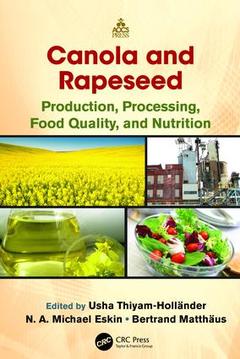Canola and Rapeseed Production, Processing, Food Quality, and Nutrition
Coordonnateurs : Thiyam-Holländer Usha, Eskin N.A. Michael, Matthäus Bertrand

In 2010, esteemed researchers gathered at a workshop held at the Richardson Centre for Functional Foods and Nutraceuticals at the University of Manitoba in Winnipeg, Canada. Drawn from these proceedings, Canola and Rapeseed: Production, Processing, Food Quality, and Nutrition presents state-of-the-art information on the chemistry of the minor constituents of canola and rapeseed and their impact on human health. The book also identifies new areas of research and opportunities for the industrial application of functional foods and nutraceuticals from canola and rapeseed.
Topics include:
- The historical development, properties, and performance of canola
- Characteristics and bioactives of sinapic acid derivatives and the decarboxylation pathways leading to their formation
- Canola protein processing
- High omega-9 canola oils and their future applications
- Modification of Brassica oilseeds
- Rapid analytical methods for measuring oil content
- The potential of ultrasound and supercritical fluid extraction for producing value-added by-products
- The processing of virgin rapeseed oils in Europe
- Extraction and application of canola protein
- The frying stability of high-oleic low-linolenic acid canola oils
- The potential of mustard oil for biodiesel
The final chapters demonstrate the health benefits of canola, including antioxidant, antimutagenic, and anticancer properties. Authored by experienced researchers in the field, the book chapters have been expanded considerably to include a number of areas not contained in the original workshop, providing comprehensive coverage of the potential of this essential crop.
Canola Research: Historical and Recent Aspects. An Update on Characterization and Bioactivities of Sinapic Acid Derivatives. Valuable Vinylphenols from Rapeseed and Canola: Decarboxylative Pathways. Processing of Canola Proteins: A Review. The Future of Omega- Oils. Modification of Seed Oil Formation in. Oilseed Species. Measurement of Oil Content by Rapid Analytical Techniques. The Potential for Ultrasound and Supercritical Fluid Extraction for Value-Added Processing of Canola. Processing of Virgin Canola Oils. Rapeseed Proteins: Recent Results on Extraction and Application. Frying Stability of High-Oleic, Low-Linolenic Canola Oils. Biodiesel from Mustard Oil. Canola Oil and Heart Health: A Historical Perspective. Canola Oil: Evolving Research in Obesity and Insulin Resistance. Rapeseed and Canola Phenolics: Antioxidant Attributes and Efficacy. Nutritional Impact of Fatty Acid Composition of Canola Oil and Its Effect on the Oxidative Deterioration. Effect of Canolol on Oxidation of Edible Oils. Canola Oil, Canolol and Cancer: Evolving Research. Canolol as a Promising Nutraceutical: Status and Scope. Index.
Usha Thiyam-Holländer is an assistant professor at the Department of Human Nutritional Sciences, based at the Richardson Centre for Functional Foods and Nutraceuticals, University of Manitoba, Canada, where she researches the impact of various novel aspects of processing on canola oil and minor components. Her work also focuses on plant-based functional foods and nutraceutical ingredients and the impact of innovative technology, isolation, and optimization. Her interests include biorefining and environmentally friendly processes for deriving functional ingredients.
Michael N.A. Eskin
Bertrand Matthäus runs a laboratory at the Max Rubner-Institut (MRI), Federal Research Institute for Nutrition and Food, in the Department of Lipid Research of the German Federal Ministry of Nutrition, Agriculture and Consumer Protection. He conducts research dealing with the improvement of the quality of fats and oils, especially canola oil. His work focuses on the investigation of frying processes; contaminants such as 3-MCPD esters, acrylamide, phthalates and 4-hydroxy-2-trans-nonenal; and the investigation of the oxidation of edible fats and oils.
Date de parution : 11-2016
15.6x23.4 cm
Disponible chez l'éditeur (délai d'approvisionnement : 14 jours).
Prix indicatif 78,50 €
Ajouter au panierDate de parution : 11-2012
Ouvrage de 320 p.
15.6x23.4 cm
Disponible chez l'éditeur (délai d'approvisionnement : 15 jours).
Prix indicatif 220,72 €
Ajouter au panierThèmes de Canola and Rapeseed :
Mots-clés :
Rapeseed Oil; Canola Oil; Nutraceuticals; Sinapic Acid; Nutrition Science; Food Science; Canola Seeds; Moisture Content; Rapeseed Meal; Erucic Acid; Ala Content; SC CO2 Extraction; Conventional Canola; Fatty Acid Prole; Long Chain Omega-3 PUFA; Rapeseed Proteins; Canola Meal; Crude Canola; Canola Council; Canola Protein; Oxidative Stability; Oil Diet; Omega-3 PUFA; Oleic Acid; National Academy; Dietary Ala; Increased Seed Oil Content



